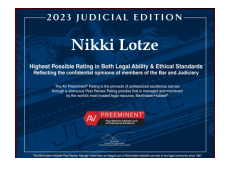Our criminal defense attorney at Lotze Mosley, LLP know that the federal government mandates every U.S. state, district — including Maryland and Washington D.C. — and territory must maintain a sex offender registry.
Within that mandate, each jurisdiction has the option to define and expand upon the types of offenses that can categorize the individuals listed in their database.
More than 760,000 people are currently listed on states’ sex offender registries, and the one consistent question most have is, once you are on it, how do you get off it?
This answer is much more complicated. Here is what you need to know about the process.
Am I Eligible to Be Removed from the Sex Offender Registry?
Before anyone who is registered as a sex offender can be removed from the list, they must consider two things:
- Whether the offense can be removed.
- Whether the offender is eligible for removal.
Each U.S. state, district, and territory has different legal requirements for those two questions.
Several factors that may impact each state’s stance on removal from their registry may include, but are not limited to:
- The age at which you committed the offense.
- The severity of the crime.
- The likelihood of your committing sex offenses in the future.
- The length of the required waiting period after serving a sentence or parole.
- If the conviction was revoked, set aside, canceled, or pardoned
- Other convictions/existing criminal record.
- Out-of-state convictions.
Each jurisdiction has several classification levels, or tiers, which correspond to the various kinds of sex offenses that will land a person on their sex offender registry.
When removal is a possibility, each jurisdiction has established time periods that must elapse before a petitioner can file to have his or her name removed from the sex offender registry.
The most serious sex crimes often require a lifetime registry, in which case, no petition for removal is allowed.
What Can I Do If I Am Eligible to Have My Name Removed from the Sex Offender Registry?
The first thing you should do is speak with an experienced criminal defense lawyer in Washington D.C. or Maryland to help ensure your first attempt at expunging your record or petitioning the court for removal is managed properly, so you are not rejected for failing to properly file for removal.
You will be required to include documentation that shows you have completed all the legal requirements from your sex crimes charge, and that you are no longer a threat to the public, which may include court documentation, certificates from required counseling sessions and/or treatments.
Once the petition is filed, the court will review it, and determine whether your request is approved or denied.
If you are pursuing removal from a sex offender registry in Washington D.C. or Maryland, you do not have to complete the daunting legal steps or face the judge alone. Contact our experienced Washington D.C. Sex Crimes attorney at Lotze Mosley, LLP to ensure each legal step and requirement is managed properly by calling (202) 393-0535 for help today.
Related Links:
- What is Online Solicitation of a Minor
- Can Law Enforcement Collect My Dna Without a Warrant in California
- Mounting a Successful Sex Crimes Defense in the Metoo Era
- Sex Crimes the Consequences of False Allegations
- Sex Offender Residency Restrictions
- Failure to Register as a Sex Offender
- What Are the Different Types of Prostitution Charges in Maryland
- How Do the Courts Identify the Classes of Sex Offenders in Washington DC
- When Am I Required to Register as a Sex Offender Washington DC













